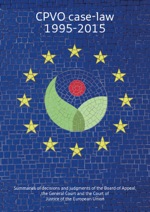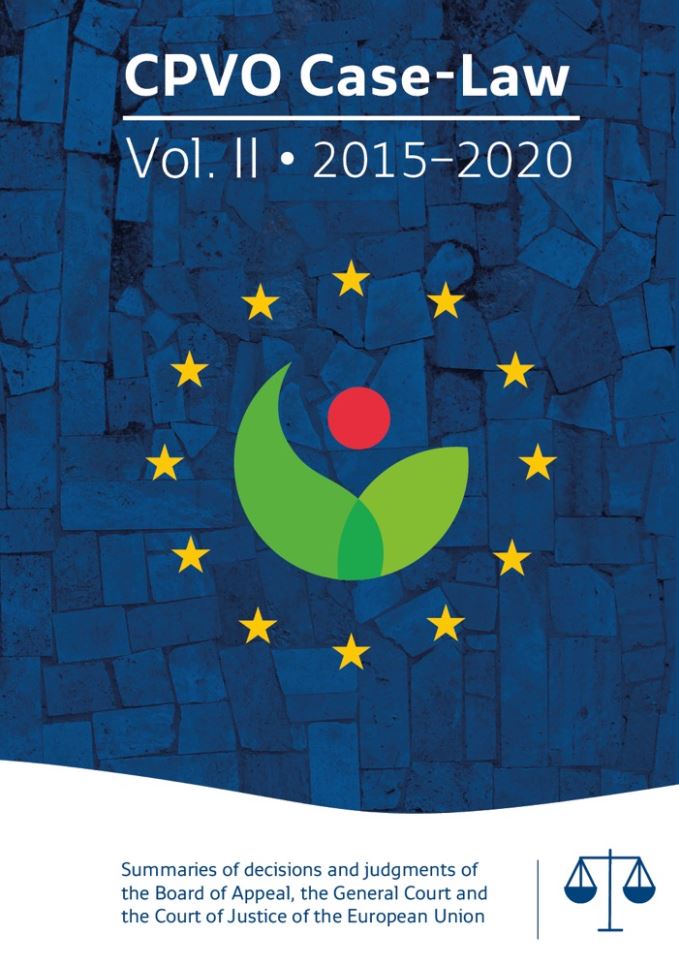Contents
LAW
Legislation in force
In this section you will find the law relating to the system of Community plant variety rights, in particular the three main EU regulations of the CPVO and also on Farm Saved Seeds exemption, including the amendments made since its adoption.
PVR case-law
PVR case-law database
The PVR case-law database is a compilation of decisions and judgments of the National Courts of EU Member States, the General Court, the Court of Justice, the Boards of Appeal of the CPVO, EPO and the EUIPO dealing with plant variety related issues. To help you find a particular case, you can browse through our list of keywords.
The database provides summaries of cases in English. The related decisions and judgments are available in their original language. Please note that the documents supplied in the database are not the official versions of the decisions or judgments taken by the respective deciding bodies. If you wish to have access to the official decisions or judgments, please consult the deciding body concerned. You may use this data for personal use, for any other use please contact the CPVO.
The CPVO tries to provide data of the highest quality possible. The database is a living system which is not necessarily complete, however the database is updated regularly. It is an interactive system which allows users to ask questions or to communicate additional information and/or cases to the CPVO via the following link: PVR case-law database
PVR case-law 1995 – 2015 booklet volume I

At the occasion of its 20th anniversary in 2015, the CPVO published a booklet. It provides an overview of the decisions of the Board of Appeal of the CPVO as well as judgments on further actions and appeals to the General Court and the Court of Justice of the European Union from 1995 until May 2015.
This publication can be requested at the Publications Office of the EU or downloaded in medium resolution.
PVR case-law 2015 - 2020 booklet volume II

The CPVO case-law 2015-2020 Volume II offers a summary of the latest decisions and judgments of CPVO's Board of Appeal, of the General Court and of the Court of Justice of the European Union. Download the booklet.
PRACTICE
Legal Unit
The Legal Unit provides legal advice to the President and the other units of the Office, both on matters related to the CPVR system and on issues of an administrative nature; provides legal interpretations and opinions, and also draws up draft legislation; participates in various CPVO committees, thus ensuring that EU procedures and legislation are consistently applied by the Office; manages the administration of objection proceedings to applications for CPVRs; manages the nullity and cancellation requests of CPVRs; represents the Office in proceedings before the Board of Appeal, the General Court and the Court of Justice of the European Union.
Objection to a CPVR (Art. 59 Council Regulation (EC) No 2100/94)
Any person may lodge with the Office a written objection to the grant of a CPVR at any time after the application (publication of the application) and before the granting date. For denominations only, the objection must be lodged within 3 months of the publication of the proposed denominations.
Objectors shall be party to the proceedings for grant of CPVR in addition to the applicant. Objections may be based only on the contention that:
- the conditions of DUS and Novelty are not complied with (Art. 7 to 11) and/or
- there is an impediment to a proposed variety denomination (Art. 63(3) or (4)
The Committee responsible for ‘decisions on grants and/or objections’ takes the decision on the objection (Committee 3).
Nullity of a CPVR (Art. 20 Council Regulation (EC) No 2100/94)
The Office shall declare the CPVR null and void, both by its own motion or under request, if it is established that:
- the conditions of distinctness or novelty were not complied with at the time of the CPVR; or
- the conditions of uniformity and stability were not complied with at the time of the grant of the right, when the grant of the CPVR has been essentially based upon information and documents furnished by the applicant; or
- the right has been granted to a person who is not entitled to it, unless it is transferred to a person who is so entitled.
The Committee responsible for ‘decisions on nullity and/or cancellation of protection’ takes the decision on the nullity (Committee 1). Once the CPVR is declared null and void it shall be deemed not to have had, as from the outset, the effects specified in the Council Regulation (EC) No 2100/94 (ex tunc).
Cancellation of a CPVR (Art. 21 Council Regulation (EC) No 2100/94)
The Office shall cancel the CPVR, both by its own motion or under request, if it is established that:
- the uniformity and stability conditions are no longer complied with
The Office may cancel the CPVR under certain conditions, both by its own motion or under request, if it is established that the holder, after being requested to do so, and within a time limit specified by the Office:
- has not fulfilled an obligation pursuant to Art. 64(3); or
- in the case referred to in Art. 66, does not propose another suitable variety denomination; or
- fails to pay fees to keep his CPVR in force; or
- no longer satisfies the conditions laid down based on nationality and procedural representation (dealing with entitlement) either as the initial holder or as successor in title as a result of a transfer pursuant to Art. 23.
The Committee responsible for ‘decisions on nullity and/or cancellation of protection’ takes the decision on the nullity (Committee 1). The Office shall cancel the CPVR with effect in futurum (ex nunc).
Actions before the Board of Appeal, the General Court and the Court of Justice of the European Union (Art. 67 and 73 Council Regulation (EC) No 2100/94)
Any natural and legal person may appeal, subject to Art. 82, against a decision of the Office.
An appeal shall lie from decisions of the Office which have been taken pursuant to Articles 20 (Nullity), 21 (Cancellation), 59 (Objections), 61 (Refusal of an application), 62 (Grant of an application), 63 (Approval of a variety denominations) and 66 (Amendment of a variety denomination), as well as on decisions related to fees pursuant to Article 83, to costs pursuant to Article 85, to the entering or deletion of information in the Register pursuant to Article 87 and to the public inspection pursuant to Article 88.
An appeal may lie from decisions of the Office pursuant to Articles 29 (Compulsory licensing) and 100 (Change in holdership of CPVR), unless a direct action is brought before the Court of Justice pursuant to Article 74.
The time limit to file an appeal is two months from the date of service of the decision, where addressed to the appealing person or, in the absence thereof, from the date of publication of the decision. The written statement setting out the grounds of appeal shall be filed within four months after the aforesaid service or publication.
Any natural or legal person may appeal against a decision of the Office addressed to that person or against a decision which, although interfering with a decision addressed to another person, is of direct and individual concern to the former who has been unsuccessful (whole or in part) in an appeal procedure, may lodge a further action against a decision of the Board of Appeal before the General Court of the European Union.
The action before the General Court may be brought on grounds of lack of competence, infringement of an essential procedural requirement, infringement of the Treaty, of Regulation (EC) No. 2100/94 or of any rule of law relating to their application, or misuse of power. The action shall be brought before the General Court within two months of the date of service of the decision of the Board of Appeal.
The rulings from the General Court may be appealed before the Court of Justice.
